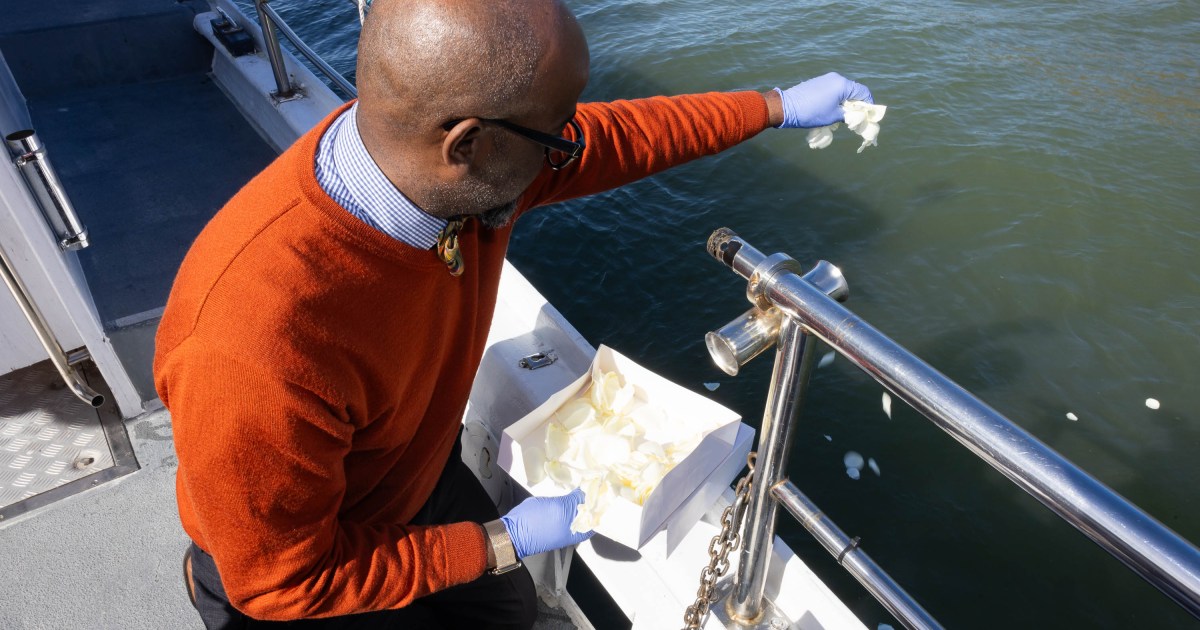San Francisco’s unclaimed dead get a unique funeral

🌈 Abstract
The article discusses the practice of scattering the cremated remains of San Francisco's unclaimed dead at sea near the Golden Gate Bridge. It explores the history, scale, and personal stories behind this ritual, which has been carried out by the city for decades.
🙋 Q&A
[01] Scattering the Unclaimed Dead
1. What is the process of scattering the unclaimed dead in San Francisco?
- Every month, the owner of Colma Cremation and Funeral Services, Reuben Houston, and his assistant Johnny Rangel, take a boat to the mouth of the Golden Gate Bridge to scatter the cremated remains of San Francisco's unclaimed dead.
- They carefully open the bags containing the ashes, read the names, and scatter the remains into the water while playing Louis Armstrong's "What a Wonderful World."
- The process is carried out with dignity and respect, as if the deceased had family and friends present.
- The GPS coordinates of the scattering are recorded in case anyone later wants to know where their loved one was laid to rest.
2. How does San Francisco's approach to handling unclaimed dead differ from other major cities?
- Unlike New York, which buries its unclaimed dead in a potter's field, and Los Angeles, which holds public ceremonies to bury them in a communal grave, San Francisco scatters the ashes at sea near the Golden Gate Bridge.
- This practice has been in place since at least the 1980s, and it provides a more peaceful and dignified end for the city's unclaimed dead.
3. What are the reasons behind the high number of unclaimed dead in San Francisco?
- San Francisco has seen a record number of overdose deaths in recent years, many involving the synthetic opioid fentanyl.
- The unclaimed dead are often the most vulnerable members of society - the impoverished, addicted, elderly, or those who have become disconnected from society.
- The number of unclaimed dead in San Francisco has doubled in the past 20 years, far exceeding the numbers in neighboring counties like San Mateo and Alameda.
4. How does the history of San Francisco's unclaimed dead relate to the city's past?
- The creation of San Francisco's medical examiner's office was partly driven by the need to handle the bodies of prospectors and others who died during the Gold Rush era and were left unclaimed.
- Just as in the past, the city's unclaimed dead today are often the most marginalized members of society, dying alone and penniless.
[02] The Role of the Medical Examiner's Office
1. What is the process the Medical Examiner's Office follows for handling unclaimed bodies?
- When a person dies in San Francisco and is unclaimed, the Medical Examiner's Office is responsible for their remains.
- The office searches for next of kin and, if unsuccessful, refers the case to the Office of the Public Administrator, which investigates to try to identify family members or assets to cover funeral costs.
- If no one claims the body, the remains are stored by a contracted funeral home for at least one year before being scattered at sea.
2. How does the Medical Examiner's Office's handling of unclaimed bodies compare to other counties?
- San Francisco has a much higher number of unclaimed dead compared to neighboring counties like San Mateo and Alameda, which have significantly fewer.
- This reflects the unique challenges and demographics of San Francisco, which has seen a rise in overdose deaths and homelessness in recent years.
[03] The Personal Stories
1. What insights does the article provide about the individuals whose remains are scattered?
- The article shares the names and some details about the 28 individuals whose remains were scattered on the day described, including their ages, causes of death, and ethnicities.
- Many died from drug overdoses, highlighting the city's ongoing opioid crisis and the vulnerability of the unclaimed dead.
- Despite their diverse backgrounds, the article suggests they share a common fate of dying alone and penniless in San Francisco.
2. How does the funeral home owner, Reuben Houston, approach this responsibility?
- Houston treats the scattering of the unclaimed dead with the same dignity and care as he would for paying clients at his funeral home.
- He sees it as a "ministry" and believes he is standing in for the deceased's absent family and friends.
- Houston is grateful for every unclaimed person whose remains are returned to family, as that means one fewer scattering he must perform.